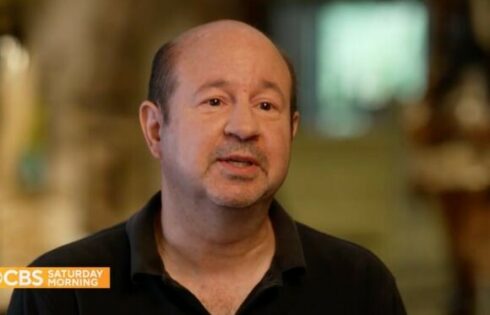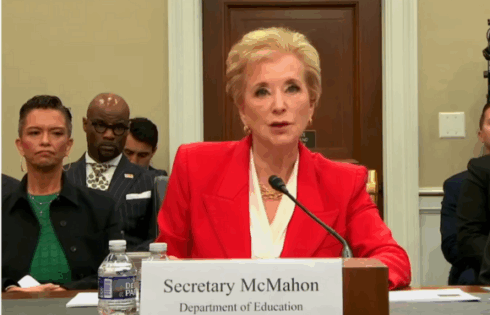
Other reports include an administrator saying the school is ‘going to hire the most qualified candidates’ and a professor saying it was ‘challenging’ to speak to someone without an interpreter
In December of last year, a professor at the University of Illinois-Chicago set up a GroupMe chat room for students of his to ask questions about an upcoming assignment for which students had to write a five to seven page paper about some aspect of technology.
“Can it literally be any technology?” one student asked. “I’m scared I’m gonna pick something everyone’s doing.”
“Uh, I mean, im hoping you’re not starting your final paper right now as it’s due pretty soon,” the professor responded. “It doesn’t matter if you pick something other people pick.”
“Okay. And life gets in the way sometimes,” the student answered.
Eighteen minutes later, the concerned professor responded, citing the late date. “The paper is due tomorrow at midnight. I look forward to reading everyone’s papers!”
“Yes I know. I don’t think I said anything bad,” the student responded. “I was just trying to ask a question.”
The professor then took the conversation offline, messaging the student directly.
“I didn’t want to put this in the group chat, and I don’t really care either way (but others might, which is why I feel like I need to mention it), but the reason I asked is because ‘life gets in the way sometimes’ as a reply to your professor comes off as really defensive.”
“Hi,” the student responded. “I’m in a very hard place in my life as I’ve emailed you about and I felt immediately judged bc of your response to my question. It felt very mean and caught me off guard. I’ve never been mentally able to start my assignments very early due to my anxiety,” the student wrote.
“There was no intent of judgment,” the professor answered.
If the professor thought that was the end of the discussion, he was wrong. Soon, the student filed a complaint against him with the school’s Bias Reporting Tool, which allows campus community members to report one another anonymously for things said in private conversations or within classrooms.
“I asked a question in the forum and was met with a rude and inappropriate response,” the student said in their complaint against the professor. “After this, [the professor] messaged me privately on GroupMe and I felt it was not appropriate and it was intimidating,” the student wrote.
“Now I am very worried he will grade my final harshly,” the student added, demanding to know the rules about “a professor messaging me privately.”
“I would like to know what is deemed appropriate and what is not.”
Just weeks ago, the UIC Office for Access and Equity issued a news release celebrating the one-year anniversary of the new Bias Reporting tool, calling it “a supplement” to the school’s non-discrimination policy “with additional opportunities for education, training and services.”
“As acknowledged in UIC’s Diversity Strategic Plan, we cannot take meaningful action towards building an inclusive climate without also addressing the biases and prejudices that may be present in our community,” said Jessica Joslin, director of the UIC Dialogue Initiative and Diversity Education.
According to the school, 43 bias reports were filed between April 2020 and April 2021.
The College Fix recently obtained copies of the reports through an open records law request. The names of both the individuals filing the reports and those targeted by the reports have been redacted to protect their identities.
The reports were obtained as The Fix continues to investigate the types of complaints that are lodged through bias response teams at college campuses across the nation. Nearly two dozen universities have been included in the investigation so far since it launched in 2019.
At UIC, during one online town hall meeting, a campus administrator was asked if the school would be trying to hire more diverse faculty for the incoming class. The administrator said the school “was just going to hire the most qualified candidates.”
“He said it was hard to find diverse faculty and that we already diverse,” wrote a student who reported the administrator to the bias hotline.
The school “says they value diversity yet will not commit to anything to support students of color or hiring of diverse faculty,” the student wrote. “This response does not make me feel supported as student [sic] of color and makes it clear that all his diversity talk is just for show and that he does not care.”
The student recommended “cultural competence” training for all faculty, including more guest speakers of color.
In another case from April of this year, a professor was detailing some of the obstacles businesses can face and relayed a story about one he had a patient who didn’t speak English and demanded an interpreter, calling it “a real challenge.”
“It makes me feel very uncomfortable that he is describing a patient as a ‘challenge’ just because they need an interpreter,” a student wrote in a complaint about the professor. The student said the professor “promoted a stigma against people who need accommodations.”
The student requested the professor be better trained in “language and cultural sensitivity,” specifying the training should be “in person, not just prerecorded.” The student also demanded the school notify the professor that a bias report had been filed against him.
Even though campuses across the country were closed through much of last year during the COVID-19 pandemic, many bias reports were still filed, some having to do with the pandemic itself.
In February of this year, a participant in a Zoom conference (pictured) was reported for referring to COVID-19 as the “Wu-Flu.”

“The term has an obvious connection with xenophobia and it was uncomfortable to read during class,” wrote one student, noting the school had sent campus wide emails ordering students not to refer to the virus as the “China virus” or the “Wuhan flu.”
The student recommended the school reach out to the offending student to counsel him on “the harmful connotation of the term.”
Early in 2020, a student reported walking down the street in Chicago’s Chinatown, only to have people walk around his Asian friends and cover their mouths when they passed.
In March, a student reported sneezing while on Chicago’s Blue Line train. After the sneeze, the student said three people looked at them and didn’t stop staring. “I moved further down the train car and then they stopped looking at me,” the student said.
A different student reported entering a BP gas station when they passed a man who spit on them, and said “corona****.”
Other instances reported to the UIC Bias Reporting Tool included:
-A student tweeted “Free my boy” in response to the arrest of Kyle Rittenhouse, a teenager arrested in Kenosha, Wisconsin for shooting and killing two anti-racism protesters.
-A number of complaints were made about a student who posted a pro-Donald Trump Instagram story (pictured) that criticized the Democratic Party for making people of color dependent on government handouts.

“Trump is making it harder for black people to receive handouts and, thereby making it easier for them to create their own opportunity,” the post read.
One student urged disciplinary action against the student, saying the school “has a duty to not just be non-racist, but to actively be anti-racist, so as not to perpetuate the already racist systems we have within our legal system.”
-A student who wrote they have a special “PTSD accommodation for trigger warnings” reported a professor for telling his students he “doesn’t believe in trigger warnings because I think you’re all adults.”
“You are going to have to face difficult things and this case brings up some of those difficult issues,” the professor said on a recording taken by the student. “So there is my non-trigger trigger warning because we’ve got to take on these difficult cases and look at them as objective of light as we humanly can.”
The student reported the professor, saying “it really hurt hearing the comment because one of my accommodations is a trigger warning.”
“It made me belittled for having this accommodation,” the student wrote.
-One student objected to campus wide emails being sent by the school, calling them “intimidation.”
The student doesn’t make clear which email they are referring to, but wrote the email “causes fear of retribution for having a different opinion.” The student added the official school emails promote “a violent Marxist agenda and nothing more.”
-One student objected to Indian-American students openly taking to social media to say they wouldn’t want a roommate that wasn’t also Indian.
“People should welcome anyone regardless of nationality,” the student wrote, adding that the posts about roommate preference “make me feel unwelcomed in the Indian community.”
A UIC spokesperson did not respond to a request by The College Fix to comment for this story.
MORE: University of Illinois-Chicago teaches students to use ‘inclusive language’
IMAGE:Vladimir Gjorgiev/Shutterstock
Like The College Fix on Facebook / Follow us on Twitter






Please join the conversation about our stories on Facebook, Twitter, Instagram, Reddit, MeWe, Rumble, Gab, Minds and Gettr.